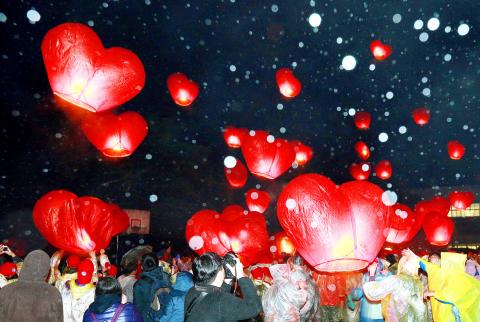A coalition of environmental groups yesterday urged local governments to rein in sky lanterns, a tradition it said has become too commercialized and damages the environment.
The coalition, including the Wild at Heart Legal Defense Association, Taiwan Environmental Protection Union, Taiwan Watch Institute and others, issued a joint statement against the annual Sky Lantern Festival in New Taipei City’s Pingsi District (平溪), which was attended by the mayors of New Taipei City, Taipei and Keelung yesterday.
The coalition said sky lanterns harm birds and forests, and endanger public safety, calling on mayors not to support the festival.

Photo: Fang Pin-chao, Taipei Times
Following a high-profile celebration of the 2003 Pingsi Sky Lantern Festival and promotional campaigns, the festival has become one of the Tourism Bureau’s 12 national festivals, making the tradition of sky lanterns another commercialized spectacle, but also a pollution event, the coalition said.
Traditional sky lanterns, usually 30cm tall, are made from cotton paper on a bamboo frame. Joss paper is placed inside the lanterns and lit to provide hot air which makes the lanterns fly. Such lanterns generally burn out when flying and unburned parts that fall to the ground decompose, as they are made of natural materials, so they have little environmental impact, the coalition said.
However, modern sky lanterns, usually at least twice the size of traditional lanterns, are made with a wire frame and chemically coated and water-resistant paper, because bamboo lanterns cannot be released on rainy days.
Modern lanterns generally do not burn completely and land in nearby forests, causing pollution and even fires.
“It is not tradition, but the commercialized, industrialized festival that we are against. The Pingsi Sky Lantern Festival has erased the traditional culture of family reunion and religious worship, turning the event into a mere tourist attraction, where government officials open the festival with giant lanterns, followed by a massive wave of lantern launches by tourists. It is not the tourism model that a beautiful town like Pingsi should follow,” the coalition said.
They said a celebrity who refused to host the festival this year for environmental reasons won the support of thousands of netizens, which suggested that awareness about the issue has been grown.
The coalition called on the government to build a sustainable tourism plan to preserve cultural tradition, while protecting the environment.

The Chinese military has built landing bridge ships designed to expand its amphibious options for a potential assault on Taiwan, but their combat effectiveness is limited due to their high vulnerability, a defense expert said in an analysis published on Monday. Shen Ming-shih (沈明室), a research fellow at the Institute for National Defense and Security Research, said that the deployment of such vessels as part of the Chinese People’s Liberation Army (PLA) Navy’s East Sea Fleet signals a strong focus on Taiwan. However, the ships are highly vulnerable to precision strikes, which means they could be destroyed before they achieve their intended

The Taiwan Experience Education Program (TEEP) has funded short-term internships in Taiwan for more than 4,500 young people from more than 40 countries since 2015, with the goal of attracting and retaining international talent, the Ministry of Education said yesterday. Fifty-five colleges launched 514 projects this year, including in fields such as semiconductors, artificial intelligence, medicine and biotechnology, green energy, and sustainability, it said. The program provides research and practical internships in Taiwan for two to six months, and offers cultural exchange and networking opportunities, the ministry said. For example, National Formosa University’s Embedded System and Autopilot Laboratory developed two solar-powered drones in

GLOBAL: Although Matsu has limited capacity for large numbers of domestic tourists, it would be a great high-end destination for international travelers, an official said Lienchiang County’s (Matsu) unique landscape and Cold War history give it great potential to be marketed as a destination for international travelers, Tourism Administration Director General Chen Yu-hsiu (陳玉秀) said at the weekend. Tourism officials traveled to the outlying island for the Matsu Biennial, an art festival that started on Friday to celebrate Matsu’s culture, history and landscape. Travelers to Matsu, which lies about 190km northwest of Taipei, must fly or take the state-run New Taima passenger ship. However, flights are often canceled during fog season from April to June. Chen spoke about her vision to promote Matsu as a tourist attraction in

Taipei resident Mu Chu-hua caught some glimpses of China’s mighty military parade on YouTube on Wednesday. As she watched hypersonic missiles roll down Beijing’s Changan Avenue and troops march in lockstep, she did not feel like they posed a threat to Taiwan. Mu, a 69-year-old retiree, said she saw the parade as simply a way for Chinese President Xi Jinping (習近平) to “say thank you to the troops.” “I thought it was quite normal,” she said. “It was very cool.” China’s military parade commemorating the end of World War II was being watched internationally for insights into Beijing’s military advances and its show